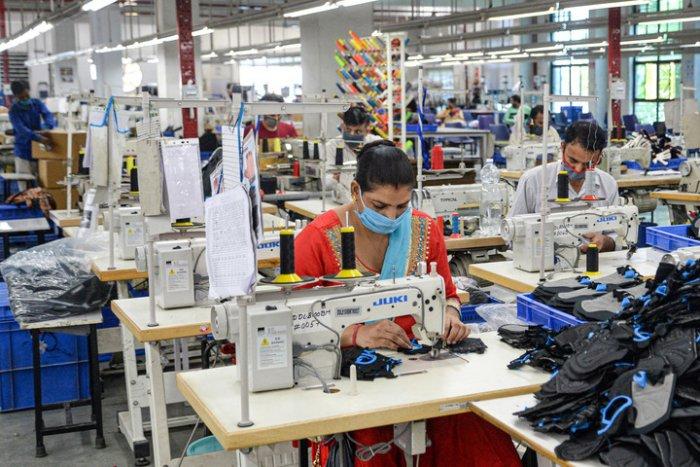
Representational Image. Image Courtesy: PTI
The Garment and Textile Workers Union (GATWU) is planning to announce a strike if monthly wages are not hiked as per the Karnataka government’s February 22, 2018, draft notification. As per the order, the wage of unskilled workers should have been hiked to Rs 445 (basic pay) plus dearness allowance (DA), totalling around Rs 13,800. However, workers earn a basic pay of Rs 341.97 plus Rs 59.63 DA, which adds up to Rs 10,441/month.
In 2017-2018, the then-Congress government in Karnataka revised the minimum wages in more than 30 scheduled industries only to withdraw it due to industry’s opposition. Subsequently, trade unions challenged the withdrawal of the minimum wage hike in the High Court, which ruled in their favour. The affected industries appealed the verdict in the Supreme Court but their petition was dismissed. They have now filed a review petition. Consequently, garment industry workers have missed out on wages of, at least, Rs 3,000/month since 2018.
The root of the crisis
The dispute started with two notifications issued by the state government. The first notification, issued on December 30, 2017, revised the minimum wages in more than 30 scheduled industries across Karnataka except the garment industry. The 2018 notification revised the minimum wage in the garment industry as well. However, both notifications were withdrawn on March 22, 2018, following lobbying by industry. They argued that labour costs made up 25%-30% of the total expenses, and the revised minimum wages would adversely affect their ability to do business and remain competitive. Subsequently, the Karnataka government rolled back the hike with the intention of revising the wages in the future.
The rollback of the notifications was challenged by AITUC and CITU in the HC. In his judgement, Justice Krishna S Dixit stood by the unions.
The arguments put forth by industry were taken apart in the ruling:
Industry maintained that their interests were not fairly represented in the minimum wage advisory board. However, the court found that the advisory board consisted of members from the Karnataka Small Scale Industries Association (Kassia) and the Federation of Karnataka Chambers of Commerce and Industry (FKCCI). Therefore, industry was well represented.
It was claimed that a revision of 200%-350% of the 2009 minimum wages will strike a death knell for many industries. The court observed that in U. Unichoyi And Others vs The State Of Kerala, the apex court had ruled that the Minimum Wages Act, 1948, purports to prevent the exploitation of labour and hardships caused to employers by wages fixed by this Act are irrelevant. “In an underdeveloped country which faces the problem of unemployment on a very large scale, labour may offer to work on starvation wages. The policy of the Act is to prevent the employment of such sweated labour,” the top court had observed.
Industry argued that the calculation of expenses and consumption had been done on the basis of one earning member while even women are working these days. The court observed that industry did not support its claim by providing statistical data regarding the male-female employment ratio. Further, Parliament had already enacted laws mandating individuals to care for aging parents. Further, customary personal laws also provide for the maintenance of the wife, children and parents who are incapable of maintaining themselves.
It was claimed that the minimum wages in Karnataka were now much higher than neighbouring states. The court ruled that India is a federal country and that each state has to fix the minimum wage based on the prevailing socioeconomic conditions of the working classes in that state.
Reptakos judgement
The HC added that the apex court’s observation in
Workmen Represented By Secretary vs Management Of Reptakos Brett was relevant even today. The top court had observed: “There has been a sky-rocketing rise in the prices and the inflation chart is going up so fast that the only way to do justice to the labour is to determine the money value of various components of the minimum wage in the context of today.”
Jayaram (61), one of the leaders of GATWU Karnataka, has been employed in the industry for more than 40 years. “At least, 80% of workers in this industry are women. That is why they think that they can exploit them and get away with it. As per the formula mentioned in the Reptakos Brett judgement, the minimum wage should be fixed at Rs 28,200/month. Recently, the minimum wage in the ceramic tiles industry was revised to Rs 18,176/month. The same must be done in the garments sector as well,” he told Newsclick.
As per the Act, the government must revise the minimum wages every five years to keep up with inflation.
Courtesy: Newsclick
